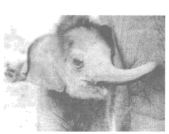题型:阅读选择 题类:常考题 难易度:普通
江苏省南通市启秀中学2020-2021学年九年级下学期英语开学考试试卷
Grandparents are respected in many human societies. But telling stories about old times and overfeeding grandchildren seem like human qualities. Are these classic grandparent behaviors really limited to humans?

Do any animals know their grandparents the way people do?
For most species on Earth, the answer is certainly " No" . " Usually, there aren't grandparents around anymore when an animal is born," said Mirkka Lahdenpera, a biologist at the University of Turku in Finland. " Even if an animal's life span does overlap (重叠) with its grandparents', most species spread out to avoid competing for resources, so the chance of running into a grandparent is slim."
But there are a few clear exceptions, primarily among mammals (哺乳动物) that live in close social groups. In troops of langur monkeys in India, older females lived together with their daughters and grandchildren. The grandmother langurs defend the group's babies against attacks and even give their own grandchildren special treatment.
Many whale species, too, travel in family groups that include both grandmothers and grandchildren.
Elephant herds are also famously matriarchal. They are led by a grandmother, who can live to around 80 years old, and are generally made up of her daughters and their young. The females in a herd form close bonds and work together to raise their young.
Lahdenper found that the babies of young mothers were eight times more likely to survive if their grandmothers lived near them than if they didn't. When the young mothers were older and more experienced at raising babies, this beneficial grandmother effect disappeared even if the actual grandmothers were still around.
Indeed, most evidence for the benefits of grand parenting comes from mammals. But in 2010, researchers found that in troops of insects called gall-forming aphids, older females defend their relatives after they've stopped reproducing (繁殖).
And what about grandfathers? Studies of humans in recent decades have shown that a living grandfather can improve a person's mental health and other indicators of well-being. But there's no evidence of that in the animal kingdom. Male animals rarely socialize with their own children, let alone any grandchildren.
A. Prepare a list. B. Explain every point. C. The following tips can be helpful. D. Rewriting makes our writing better, E. It is not easy to become a better writer. F. Good word choices are necessary for good writing. |
Tips for Writing Better Articles
Many of us don't spend a lot of time improving our writing skills. This can be a problem when we hand in our articles. Good writing skills will help us improve our grades and benefit us later in life. {#blank#}1{#/blank#}
Make good word choices.
When we' re not sure which word is the right one for a sentence, look it up in a dictionary. Many of us choose words in a hurry and don't take the time to decide if they' re proper. {#blank#}2{#/blank#}
Check facts.
If we want people to believe what we write, we must make sure our facts are true. We should use dependable facts.
Rewrite.
A common problem is that we don't like to rewrite. In fact, rewriting is the best way to find out and correct some mistakes, like grammar and spelling mistakes.{#blank#}3{#/blank#} though it takes more time and more work.
Read aloud.
Sometimes it's easier to find problems with spelling, word usage, and grammar when we read aloud. Reading al oud helps us not only find out our problems but also develop our writing.
{#blank#}4{#/blank#}
Preparing a list is necessary for writing a good article. Such a list includes: Is there a proper title? Have we explained every point? Are all the parts of the article included? This can help us to make sure that we have covered everything.
{#blank#}5{#/blank#} But with a few simple steps, we can improve our writing skills and learn how to write better articles.
试题篮